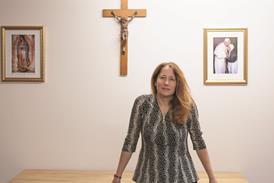I was recently in India visiting a programme which among many things supports and offers care to drug addicts and people with HIV. In the early years of its life, the founders of the work expressed their concern though their local church - until that is, the prostitutes started coming to the church. The church couldn’t cope with this and the founder and his family had to leave the church and start a new expression of being church with this despised and rejected group of people. Such is the nature of our compartmentalised thinking that we slip into language which separates this kind of expression from church. So organisations such as that of our partner is called an NGO or ‘parachurch’ organisation rather than ‘church’. So it was that I was asked to speak in Calcutta to a forum of NGO leaders and local church pastors. Not being sure of how they would define the terms, I started by getting the audience to brainstorm their understandings of the differences between a Christian NGO and a local church. One of the quotes was memorable:
Christians go to church. NGO’s go to the people
This is surely a lamentable situation. It has forced us many times to look at the barriers which effectively prevent Christians in ‘local church’ mode of thinking to contemplate reaching out to the marginalised and the poor. The same exercise helps us to analyse why many church-run projects fail in the first few years of life.
There are many factors. I intend to cluster them under five headings, illustrating each briefly from experience. But first, there seems to be a common thread which is common to all five. There is a problem which many churches face: that there is little or no critical analysis of how Biblical values influence our action. Sometimes, the idea of starting as a ‘values led’ exercise sounds odd. What are the Biblical values which we see Jesus displaying in the way he related to people? Inclusion, love, personal transformation, participation, prayer, relationships and more. The sort of question many of us fail to answer is, for example: What does the value of inclusiveness look like? How will our project look and what will it feel like for people who have been excluded all their lives? How does the fact that all the above values have to be seen as connected influence the final shape of the work? The church, for example that thought it was doing a great job of reaching out to homeless people by building a glazed-off room with a PA system in it so that they could sit in it during services without anyone being embarrassed or disturbed by the smell, obviously hadn’t thought through the impact of this action in terms of how it would influence their ability to make relationships with these people, or indeed whether such an appalling act meant that they were being at all inclusive!
The five areas which we are learning often cause local church-run community development projects to founder are:
- A failure to address the theological and cultural issues which prevail in many local churches: The cocktail of local church culture (Derek Warlock’s definition of culture is helpful: The way we do things round here) and theology are often not teased out in the minds of many ordinary church attending evangelical Christians. “Seeing people being saved is the most important thing. If people don’t become Christians through this activity, surely it is a diversion and a waste of time and resources?” But how does this statement accord with the fact that Jesus displayed the values of unconditional compassion? Ten lepers healed, only one returned to thank Jesus. “Surely, church is the coming together of Christians for teaching, prayer and worship?” Well, yes, that part happens for 4 or 5 hours out of an average waking week of about 100 hours - the icing on the cake! The problem of failing to address how theology and cultural issues are worked out in local churches is illustrated well by asking people to complete what they think is a typical church goer’s CV, and then completing a CV on the basis of Jesus life. Who were his friends, what were his likes and dislikes? Soon enough, the gulf is illustrated. There is often a lack of understanding and thinking through the root causes and impact of poverty - how does it make people feel and behave? What is the spiritual impact? The blind beggar in Luke 18:35-43. Was he a well adjusted, sweet smelling individual with good inter-personal skills, able to articulate his needs and problems clearly? Of course not. And yet Jesus called him to be brought to the centre of the crowd (the church). Participation by the crowd led to their transformation in terms of understanding of their role and the core nature of Christian ministry. Until these issues are faced and worked at, ‘social action’ will be the domain of the ‘committed few’. This itself raises another cause of failure which space prevents a fuller comment - that of ownership, or rather lack of it, by the wider church congregation. Burn out and misunderstandings abound, to the great sadness of many.
- Then there is the issue of our ability to think so dualistically that we effectively compartmentalise life into convenient boxes. ‘Evangelism’ or ‘Social Care’? What do they look like when actually brought together in an integrated way? John Stott way back in the sixties or seventies used the illustration of the two things being like two blades of a scissors. The only problem is that the paper which such scissors are meant to cut has been removed - the practical context of sacrificial living and service has been removed - which brings us on to. . . .
- The philosophising of Christianity. Christianity simply doesn’t work as a philosophy, or a theory. ‘Going to church’ is an activity which for many of us has become the totality of our Christian corporate experience. Discipleship has, in the words of author Tom Sine, become a two legged stool addressing spiritual and moral issues, but rarely does it address the need to radically transform our lifestyles. The dream that drives our lives continues to be defined by the western economic dream of the ‘better future’, rather than the Biblical dream of ‘shalom’. Churches do not create for many of us, what the sociologists call ‘plausibility structures’ - the means by which we can support and sustain, in this context, radical and distinctive lifestyles which are simpler and more celebratory. Perhaps by addressing this issue the complaint of many Christians that they don’t have enough time, or the skills to help with a church-run community initiative would be answered positively.
- There is a huge issue relating to the way local church leaders are trained. As a product myself of one of the best theological training colleges in the UK and an ordained minister, I can say that I was not trained to lead a church. I was taught how to begin to think theologically. I was not trained in the essential area of explaining how Biblical values can be contextualised to community involvement and work with the poor. I was not trained in how to facilitate processes of transformation within or outside the church. I was not trained in how to overcome conflict within the church. There are many churches struggling with leadership that simply isn’t equipped to enable people to translate Jesus’ lifestyle into practise in today’s world.
- The fifth heading is that relating to fundamental principle:participation leads to change. This is something that was touched upon already. I have a number of personal testimonies from people who recognise that before they were able to transform anything beyond themselves as a Christian, they first had to be transformed in their attitudes to the poor, the marginalised, those whom society tends to exclude. This is the painful process of being broken. These testimonies all have in common the fact that until the person intentionally decided to step outside their own assumptions of how life is and how it is to be led, they simply didn’t understand how to relate belief to reality of daily living. Ordinary people like Emma, a student who said that the one group of people she had always had a problem relating to were homeless people, but who decided to spend a year as a volunteer in a homelessness project. She ended up altering her course of study and giving her life for the issues of homelessness as a result. Personal transformation through allowing herself to participate in meaningful activity that she was able to reflect upon.
This for me seems to be one of the biggest blocks in church culture. Educationalists tell us that we learn by gaining experience - by doing and reflecting. One aspect of local church culture is that we assume that sitting in front of preacher is one of the main ways of being taught, or being ‘fed’. Perhaps in addition to traditional preaching, we should give people the space to reflect together on what they have learnt throughout the week in light of their activity and the word of God. Everything I have written above is not intended to condemn the thousands of sincere Christians who long to be ‘salt’ and ‘light’ in communities. It is a reflection on what we are learning in our work, committed as it is to enabling local churches to make a real difference for good in their communities.



























